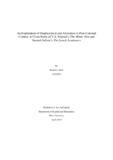An exploration of displacement and alienation in post-colonial context: a close study of V.S. Naipaul’s The Mimic Men and Samuel Selvon’s The Lonely Londoners
Abstract
The term post-colonialism implies the freedom and political emancipation of the colonized from the colonizers and examines the cultural activities used by the imperial powers to overpower the body and mind of the colonized people. It is the colonial mind that otherizes the colonized natives and has strangulated their voice as inferior over the years. As a result of the politics of colonization, the natives were not only exploited economically, politically and culturally, but also lost their land to satisfy the thirst of dominant for aggressive aggrandizement. However, with decolonization, the movements of people increased either through forced migration or voluntary reason and thus a large scale of displacement or dispersal takes place and people scatter over various parts of the world. In the first part of my thesis, I will show the theoretical aspect of post-colonial literature including hybridity, mimicry, diaspora and study of orientalism. Will show how these notions of hybridity, mimicry, diaspora is playing a crucial role in the history of different displaced communities. This concept of hybridity is associated with the work of Homi Bhaba whose analysis of colonizer/colonized relations traces their interdependency and mutual construction of subjectivities. Cultural hybridity makes a person rootless because at some point culturally hybrid person feels that he does not belong to any of the culture. It makes him to mimic a particular culture, specially the culture in power. Then another ambivalence occurs when he tries to mimic another culture. Essentially by copying them, a person who goes under the process of mimicry evidences how hollow they are. Thus, in my paper, I attempt to show the effect of mimicry and hybridity in two post-colonial novels The Mimic Men and The Lonely Londoners. In both of the novel, the authors show the effect of colonial mimicry and hybridity among the characters, who cannot fit in any identity and becomes utterly displaced. My aim of this paper is to depict how the effect of colonialism is still present in post-colonial literature. In second chapter, I will show how a post-colonial protagonist in the novel The Mimic Men, in spite of having all the privilege
Shammy 4
to flourish becomes utterly displaced due to his failure of searching for self. In the third chapter, I will depict the disillusionment of the black immigrants caused by the disturbing racial discrimination by the West in the novel The Lonely Londoners.
LC Subject Headings
Postcolonialism--Fiction.; Politicians--Fiction.; West Indians--England--Fiction.; Immigrants--Fiction.; London (England)--Fiction.Description
This thesis is submitted in partial fulfillment of the requirements for the degree of Bachelor of Arts in English, 2019.Department
Department of English and Humanities, Brac UniversityType
ThesisCollections
- Thesis, B.A. (English) [648]

